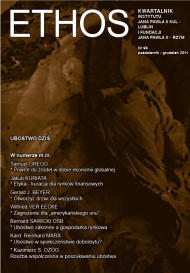Vol. 24 No. 4 (2011): POVERTY TODAY
Full Issue
FROM THE EDITORS
Articles
39-55
published: 2011-12-30
82-104
published: 2011-12-30
106-116
published: 2011-12-30
117-132
published: 2011-12-30
133-167
published: 2011-12-30
168-192
published: 2011-12-30
193-204
published: 2011-12-30
221-229
published: 2011-12-30
Notes and reviews
Reports
298-302
published: 2011-12-30
Through the prism of the Ethos
Bibliography of pontifical addresses and documents
331-338
published: 2011-12-30








